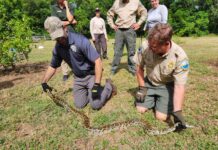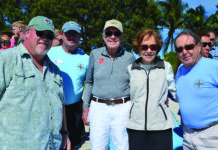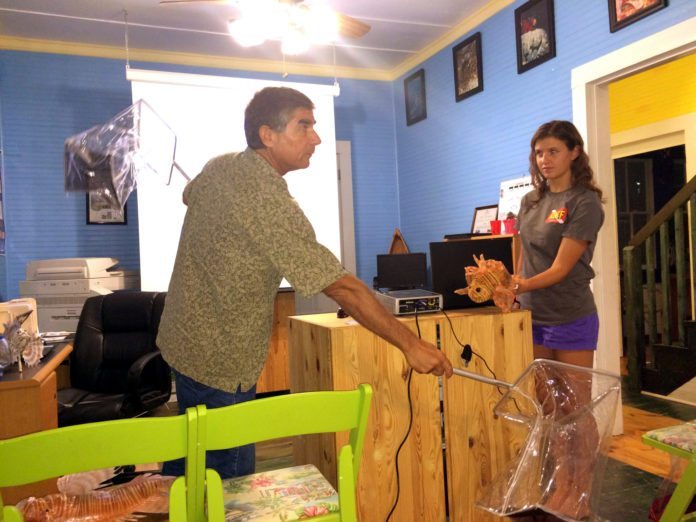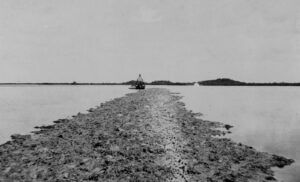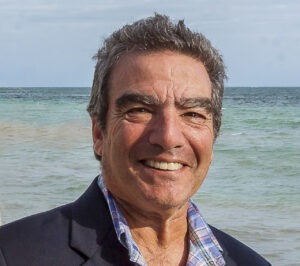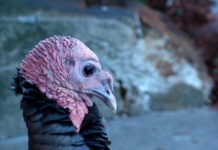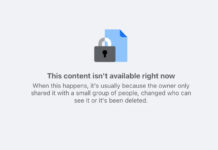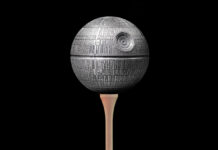It’s open hunting waters for rest of Keys
“Local control is working,” said Lad Akins, director of Special Projects at REEF. “Every lionfish we take out of the water counts, even if it’s only one or two.”
In a partnership between REEF and Florida Keys National Marine Sanctuary, permits can be issued for lionfish hunters to capture the invasive fish in 18 special protected areas (SPA’s), which are normally “no take” zones. On Wednesday, REEF hosted the lionfish permit workshop for eight participants. More than 500 lionfish permits have been issued in the Keys over the past four years.
“South Florida is a hot spot for nonnative species,” he said at the workshop. “Lionfish are first to successfully filtrate this area and take hold.”
The first sighting was in 1989 off Miami, and then in 2007 there was an Atlantic explosion of lionfish from North Carolina down to Brazil and in every Caribbean country. The Florida Keys were one of the last to see the invasive species in 2009. “There are millions here now,” Akins said.
So, why are these beautiful little beasts so dangerous? They can be found in every habitat from the shoreline to 1,000 feet deep. Their hardiness is without measure and they have a ravenous appetite.
“There were 120 different prey fish documented in the stomachs of lionfish,” Akins said. “And, they can eat anything as big as half their size. The biggest officially measured lionfish was more than 19 inches long. In its belly were juvenile snapper and grouper and ornamental fish like parrotfish, which help keep algae off the reef, and cleaner fish. All of which could be devastating to the ecology and economy of Keys waters.
Akins said the Keys’ scattered reefs are very connected and a lionfish invasion on one spot can affect the whole system. He said some areas in the Bahamas have as many as 3,000 lionfish per hectare in the Bahamas. In their native waters of the Western Pacific, those numbers are normally three lionfish per hectare. In those waters, natural predators of the lionfish include sharks, cornetfish, grouper, large eels, frogfish and other scorpionfish. Also, parasites, keep the numbers of lionfish down in the Pacific.
“They have no predators here,” he said, adding that some of the species present in Keys’ waters don’t recognize lionfish as prey.
There are no restrictions on the size or number of lionfish that can be removed from Keys waters —any place it is legal to take other fish, it is legal to take lionfish. Anglers do not need a fishing license to take lionfish by net or spear, and it is the only fish in Keys waters that can be taken by spearing on a rebreather. In order to receive a SPA permit, watermen must take the workshop, agree to have it with them while in a SPA area, and use only a net to capture the lionfish. (Spearing is not allowed in the SPAs.) The permits are valid for three years. The permit also allows the holder to temporarily place the gear on the sea floor while in the removal process, which is a big no-no any other time. Lionfish removals from a SPA need to reported within 48 hours to the Sanctuary or REEF. The best way to catch lionfish in the SPA’s is with two mesh nets or two clear nets.
Lionfish are venomous. “The pain builds over 15 to 20 minutes,” said Akins. “And, it’s an immediate pain.” He suggests a safe accent, and adding hot, non-scalding, water to the area for 30 minutes to break down the protein. It’s not like a jellyfish sting since it is under the skin, and a friend peeing on the stung victim will not help. The best place for hot water on the boat – the engine block. Venom is still active even after the fish is dead.
To learn more about permitting to take lionfish from SPA’s, contact REEF at 305-852-0030. They hold classes about every six weeks or so.
- At a recent special permitting class, Lad Akins and a REEF intern demonstrate the proper and safe way to handle a venomous lionfish while catching the invasive species in a Florida Keys National Marine Sanctuary Preservation Areas.
There is a REEF Lionfish Derby this weekend in Key Largo. Friday, Sept. 11 is a mandatory captain’s meeting, and there is a weigh-in and tasting open to the public on Saturday, Sept. 12 starting at around 5 p.m. at John Pennekamp. For more info, call REEF at 305-852-0030. All Florida lionfish tournaments can be found at myfwc.com/lionfish.
———
Sanctuary Preservation Areas include:








